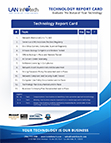For some people, the New Year holiday is just like any other day of the year. For many others, though, it’s a time of self reflection. A time to make life-changing resolutions that propel them toward a happier and healthier life. If you’re like most people, your New Year resolutions probably fall into one of these two categories — money or health. Regardless of your New Year goals, though, there’s one that should remain a top priority for everyone: Don’t fall prey to scammers.
Bringing Your New Year Resolutions to Life While Avoiding Scams
Once you make a resolution, you probably take advantage of the internet by researching tips and tricks for bringing your goals to life. Even though the internet is full of helpful information that can help you lose that extra weight you packed on during the last year, it’s also full of scammers. These scammers are biding their time as you make your internet searches. Once you make one that aligns with their scam offer, they get to work on collecting your personal information. How do they do this? It starts with malware. You make a search on the internet and come across a link on the search engines results pages. You click on the link and bam, the scammer infiltrates your computer with malware, stealing all of your personal information. The credit card information you saved to your computer from a previous purchase all of a sudden is in the hands of the scammer. From there, it’s all downhill. You start noticing charges on your credit card statement that you didn’t make.
Fortunately, it’s fairly simple to protect yourself from New Year resolution scams. All it takes is a little common sense and a few steps of caution. Let’s take a look at the top New Resolution scams you can easily avoid.
Too Good to Be True Offers
If it seems too good to be true, then it probably is. The only way you’re going to win $1,000,000 is if you go to the gas station and win it off of a legit lottery ticket. Any time you come across a website that is promising fast money or a ”guaranteed return,” it’s best to steer clear. In fact, you’ll want to exit out of the site as quickly as possible and clear it from your browsing history along with any of its cookies. In doing this, you protect yourself from the malware that the site is probably trying to download to your computer.
Tech Support Companies Offering Free Clean Up Services
Have you ever received a phone call from a tech company that mysteriously knows you have a computer? As an introductory offer to their services, they are willing to clean up your computer for free. Isn’t that so thoughtful of them? It’s not thoughtful! In fact, the only thought they have is focused on getting into your computer to steal your personal information.
Much of the time, a tech support company that calls you out of the blue will say they have discovered a virus on your computer, and they would like to help you get it off. Many people freak out at the thought of a having a virus on the computer, so they immediately say “yes, please help me.” The tech company then sends them a link to download a program to remove the virus. The ironic part, however, is that the computer was completely ok at first. It’s not until the person clicks on the download link that the computer becomes infiltrated with a virus. Not only can the virus steal your personal information, it can monitor anything and everything you do on the computer. It can even monitor your keystrokes. So while your bank account information may be safe at first, once the hacker learns your password to your online banking information by monitoring your keystrokes, he can then log into it himself and drain your account. With all of this in mind, always take your computer to a legit local computer tech if you need it worked on.
Free Checks and Money Orders
Another common New Year resolution scam comes in the form of free checks and money orders. You receive an email from a company or person who says they are unable to cash a money order. The amount on the money order is usually several hundred dollars. They say if you will at least cash it for them, you can keep some of the money for yourself. Wow, that’s easy money, right? Well, there’s a good chance the check or money is fake. And here’s the big catch, many banks can’t tell the money order is fake. So, you head down to the bank with the money order and the teller gives you the cash. Wow, she handed you $900 and all you have to send the person who sent you the money order is $650. That’s $250 in your pocket. The bad news comes the next day. After the bank sent the money order off to be processed, it came back as fake, so to compensate for the loss, the bank takes $900 back out of your checking account. But, you’ve already sent the $650 to the person who sent you the money order and you’re only left with $250 to hand back to the bank. That means you’re $650 in the hole. Lesson of the story is, never cash a money order or check for someone you don’t know. You even run the risk of getting into legal trouble if you get caught trying to cash a fake check or money order.
We hope you meet all of your New Year resolution goals, but we also want you to safe while making your dreams come true. Please remember the scams we’ve outlined above and how to avoid them.

LAN Infotech is a Microsoft Cloud Services Provider, IT Managed Support company and a leader in helping law firms, nonprofits and medical organizations deploy cloud solutions, manage computer networks, keep data protected and top technology management company. Businesses like yours need technology support to run highly-effective organizations.



